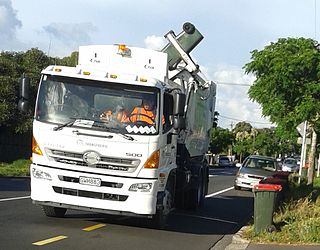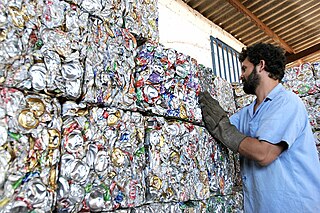
Mongolia is a country with a lacking of centralized recycling system.

Mongolia is a country with a lacking of centralized recycling system.
Currently, 90% of recyclable waste produced in Mongolia end up in landfill. [1] As of 2019, only 7% of total solid waste generated in the country is reused or exported. [2]
Ulaanbaatar has 18 recycling centers with a total annual capacity of 18,500 tons. [3]

Waste management or waste disposal includes the processes and actions required to manage waste from its inception to its final disposal. This includes the collection, transport, treatment, and disposal of waste, together with monitoring and regulation of the waste management process and waste-related laws, technologies, and economic mechanisms.

The recycling of paper is the process by which waste paper is turned into new paper products. It has a number of important benefits: It saves waste paper from occupying homes of people and producing methane as it breaks down. Because paper fibre contains carbon, recycling keeps the carbon locked up for longer and out of the atmosphere. Around two-thirds of all paper products in the US are now recovered and recycled, although it does not all become new paper. After repeated processing the fibres become too short for the production of new paper, which is why virgin fibre is frequently added to the pulp recipe.

Plastic recycling is the processing of plastic waste into other products. Recycling can reduce dependence on landfill, conserve resources and protect the environment from plastic pollution and greenhouse gas emissions. Recycling rates lag behind those of other recoverable materials, such as aluminium, glass and paper. From the start of plastic production through to 2015, the world produced around 6.3 billion tonnes of plastic waste, only 9% of which has been recycled and only ~1% has been recycled more than once. Of the remaining waste, 12% was incinerated and 79% was either sent to landfills or lost to the environment as pollution.

Waste sorting is the process by which waste is separated into different elements. Waste sorting can occur manually at the household and collected through curbside collection schemes, or automatically separated in materials recovery facilities or mechanical biological treatment systems. Hand sorting was the first method used in the history of waste sorting. Waste can also be sorted in a civic amenity site.

Armenia is underdeveloped in its waste management and recycling activities.
Waste management in Japan today emphasizes not just the efficient and sanitary collection of waste, but also reduction in waste produced and recycling of waste when possible. This has been influenced by its history, particularly periods of significant economic expansion, as well as its geography as a mountainous country with limited space for landfills. Important forms of waste disposal include incineration, recycling and, to a smaller extent, landfills and land reclamation. Although Japan has made progress since the 1990s in reducing waste produced and encouraging recycling, there is still further progress to be made in reducing reliance on incinerators and the garbage sent to landfills. Challenges also exist in the processing of electronic waste and debris left after natural disasters.

Waste are unwanted or unusable materials. Waste is any substance discarded after primary use, or is worthless, defective and of no use. A by-product, by contrast is a joint product of relatively minor economic value. A waste product may become a by-product, joint product or resource through an invention that raises a waste product's value above zero.

The management of waste in New Zealand has become more regulated to reduce associated environmental issues. According to OECD data, New Zealand is the third most wasteful country in the OECD.

Plastics are a wide range of synthetic or semi-synthetic materials that use polymers as a main ingredient. Their plasticity makes it possible for plastics to be molded, extruded or pressed into solid objects of various shapes. This adaptability, plus a wide range of other properties, such as being lightweight, durable, flexible, and inexpensive to produce, has led to their widespread use. Plastics typically are made through human industrial systems. Most modern plastics are derived from fossil fuel-based chemicals like natural gas or petroleum; however, recent industrial methods use variants made from renewable materials, such as corn or cotton derivatives.

Brazil's overall recycling rate is 4%, according to Abrelpe but differs a lot from city to city. Brazil has no structured municipal recycling programs. Only 6.4% of Brazilian municipalities have official waste recycling programs and more than 70% of Brazilians do not separate their recyclable materials into proper bins. The recovery of recyclable material is largely left to waste pickers, who earn a living by collecting recyclables and selling them to private recycling companies.
Products made from a variety of materials can be recycled using a number of processes.
Waste management in Russia refers to the legislation, actions and processes pertaining to the management of the various waste types encountered throughout the Russian Federation. The basis of legal governance for waste management in Russia at the federal level is outlined through Federal Law No. 89-FZ, which defines waste as “the remains of raw materials, materials, semi-finished products, other articles or products that have been formed in the process of production or consumption as well as the goods (products) that have lost their consumer properties”.

Plastic pollution is the accumulation of plastic objects and particles in the Earth's environment that adversely affects humans, wildlife and their habitat. Plastics that act as pollutants are categorized by size into micro-, meso-, or macro debris. Plastics are inexpensive and durable, making them very adaptable for different uses; as a result, manufacturers choose to use plastic over other materials. However, the chemical structure of most plastics renders them resistant to many natural processes of degradation and as a result they are slow to degrade. Together, these two factors allow large volumes of plastic to enter the environment as mismanaged waste which persists in the ecosystem and travels throughout food webs.
There are various issues of waste management in Thailand, including excessive plastic use, industrial waste, among others.

Packaging waste, the part of the waste that consists of packaging and packaging material, is a major part of the total global waste, and the major part of the packaging waste consists of single-use plastic food packaging, a hallmark of throwaway culture. Notable examples for which the need for regulation was recognized early, are "containers of liquids for human consumption", i.e. plastic bottles and the like. In Europe, the Germans top the list of packaging waste producers with more than 220 kilos of packaging per capita.
China's waste import ban, instated at the end of 2017, prevented foreign inflows of waste products. Starting in early 2018, the government of China, under Operation National Sword, banned the import of several types of waste, including plastics with a contamination level of above 0.05 percent. The ban has greatly affected recycling industries worldwide, as China had been the world's largest importer of waste plastics and processed hard-to-recycle plastics for other countries, especially in the West.

Data from the Solid Waste Management and Public Cleansing Corporation (SWCorp) collected from January to November throughout 2018 puts the national recycling rate at 0.06%, or about 1,800 tonnes of the 3 million tonnes of waste collected in the period. Majority of the waste were sent to landfills.

Waste management in South Korea involves waste generation reduction and ensuring maximum recycling of the waste. This includes the appropriate treatment, transport, and disposal of the collected waste. South Korea's Waste Management Law was established in 1986, replacing the Environmental Protection Law (1963) and the Filth and Cleaning Law (1973). This new law aimed to reduce general waste under the waste hierarchy in South Korea. This Waste Management Law imposed a volume-based waste fee system, effective for waste produced by both household and industrial activities.
In Egypt, waste and lack of proper management of it pose serious health and environmental problems for the country and its population. There has been some governmental attempts to better the system of waste management since the 1960s but those have not proven sufficient until now. In the last 10 years focus e attempts at recycling are present, and growing in the country. But these are largely informal or private actors, and government initiatives are necessary to properly manage these systems and provide them with appropriate resources.

Waste management in Mongolia refers to the management and disposal of waste in Mongolia.